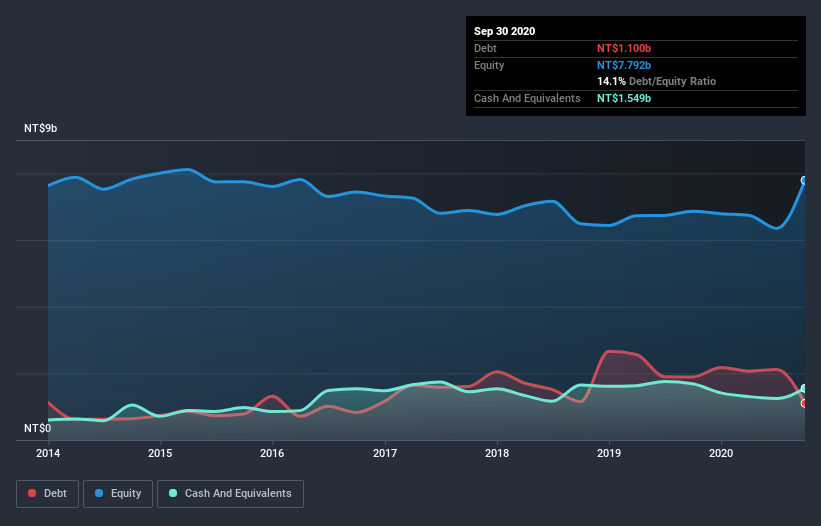The external fund manager backed by Berkshire Hathaway's Charlie Munger, Li Lu, makes no bones about it when he says 'The biggest investment risk is not the volatility of prices, but whether you will suffer a permanent loss of capital.' So it might be obvious that you need to consider debt, when you think about how risky any given stock is, because too much debt can sink a company. We can see that Sampo Corporation (TPE:1604) does use debt in its business. But the real question is whether this debt is making the company risky.
What Risk Does Debt Bring?
Debt is a tool to help businesses grow, but if a business is incapable of paying off its lenders, then it exists at their mercy. Ultimately, if the company can't fulfill its legal obligations to repay debt, shareholders could walk away with nothing. However, a more common (but still painful) scenario is that it has to raise new equity capital at a low price, thus permanently diluting shareholders. Of course, plenty of companies use debt to fund growth, without any negative consequences. The first step when considering a company's debt levels is to consider its cash and debt together.
View our latest analysis for Sampo
How Much Debt Does Sampo Carry?
You can click the graphic below for the historical numbers, but it shows that Sampo had NT$1.10b of debt in September 2020, down from NT$1.89b, one year before. But it also has NT$1.55b in cash to offset that, meaning it has NT$448.6m net cash.

How Healthy Is Sampo's Balance Sheet?
Zooming in on the latest balance sheet data, we can see that Sampo had liabilities of NT$2.33b due within 12 months and liabilities of NT$2.34b due beyond that. Offsetting these obligations, it had cash of NT$1.55b as well as receivables valued at NT$647.4m due within 12 months. So it has liabilities totalling NT$2.47b more than its cash and near-term receivables, combined.
While this might seem like a lot, it is not so bad since Sampo has a market capitalization of NT$9.36b, and so it could probably strengthen its balance sheet by raising capital if it needed to. However, it is still worthwhile taking a close look at its ability to pay off debt. Despite its noteworthy liabilities, Sampo boasts net cash, so it's fair to say it does not have a heavy debt load!
Better yet, Sampo grew its EBIT by 127% last year, which is an impressive improvement. If maintained that growth will make the debt even more manageable in the years ahead. The balance sheet is clearly the area to focus on when you are analysing debt. But you can't view debt in total isolation; since Sampo will need earnings to service that debt. So when considering debt, it's definitely worth looking at the earnings trend. Click here for an interactive snapshot.
But our final consideration is also important, because a company cannot pay debt with paper profits; it needs cold hard cash. Sampo may have net cash on the balance sheet, but it is still interesting to look at how well the business converts its earnings before interest and tax (EBIT) to free cash flow, because that will influence both its need for, and its capacity to manage debt. During the last three years, Sampo burned a lot of cash. While that may be a result of expenditure for growth, it does make the debt far more risky.
Summing up
Although Sampo's balance sheet isn't particularly strong, due to the total liabilities, it is clearly positive to see that it has net cash of NT$448.6m. And it impressed us with its EBIT growth of 127% over the last year. So we are not troubled with Sampo's debt use. When analysing debt levels, the balance sheet is the obvious place to start. However, not all investment risk resides within the balance sheet - far from it. For instance, we've identified 2 warning signs for Sampo (1 is a bit concerning) you should be aware of.
At the end of the day, it's often better to focus on companies that are free from net debt. You can access our special list of such companies (all with a track record of profit growth). It's free.
If you decide to trade Sampo, use the lowest-cost* platform that is rated #1 Overall by Barron’s, Interactive Brokers. Trade stocks, options, futures, forex, bonds and funds on 135 markets, all from a single integrated account. Promoted
New: Manage All Your Stock Portfolios in One Place
We've created the ultimate portfolio companion for stock investors, and it's free.
• Connect an unlimited number of Portfolios and see your total in one currency
• Be alerted to new Warning Signs or Risks via email or mobile
• Track the Fair Value of your stocks
This article by Simply Wall St is general in nature. It does not constitute a recommendation to buy or sell any stock, and does not take account of your objectives, or your financial situation. We aim to bring you long-term focused analysis driven by fundamental data. Note that our analysis may not factor in the latest price-sensitive company announcements or qualitative material. Simply Wall St has no position in any stocks mentioned.
*Interactive Brokers Rated Lowest Cost Broker by StockBrokers.com Annual Online Review 2020
Have feedback on this article? Concerned about the content? Get in touch with us directly. Alternatively, email editorial-team (at) simplywallst.com.
About TWSE:1604
Sampo
Engages in the manufacture, processing, contracting, wholesaling, retailing, repair, and consignment of electronics, electrochemicals, telecommunications, electrical materials, information, and audio products in Taiwan and internationally.
Average dividend payer with low risk.
Similar Companies
Market Insights
Community Narratives



